| Srl | Item |
| 1 |
ID:
120392
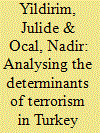

|
|
|
|
|
| Publication |
2013.
|
| Summary/Abstract |
This paper investigates the determinants of provincial terrorism in Turkey taking spatial dimension into account for the time period 1990-2006. Following a traditional global regression analysis, spatial variations in the relationships are examined with geographically weighted regression (GWR) to obtain locally different parameter estimates. Empirical results indicate that increases in income and schooling ratio tend to reduce the provincial average level of terrorism, whereas an increase in unemployment enhances it. Moreover, GWR results indicate that the provincial effects of per capita income and education are more pronounced for the Eastern and South Eastern provinces compared to the Western provinces.
|
|
|
|
|
|
|
|
|
|
|
|
|
|
|
|
| 2 |
ID:
072644
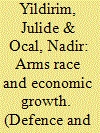

|
|
|
|
|
| Publication |
2006.
|
| Summary/Abstract |
The hostility between India and Pakistan is believed to have led to an arms race between the two countries, which might have contributed to their retarded economic growth. This paper investigates this twin problem of arms race and economic growth for the time period 1949-2003. The empirical results suggest that there is a mutual causal relationship between the military expenditures of India and Pakistan. Even though military expenditure does not Granger cause economic growth in Pakistan, there is causality from military expenditure to economic growth in India. A VAR analysis revealed that military expenditure hinders economic growth in India in the long-run, but it has a growth promoting effect in the short-run.
|
|
|
|
|
|
|
|
|
|
|
|
|
|
|
|
| 3 |
ID:
087001
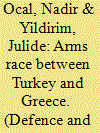

|
|
|
|
|
| Publication |
2009.
|
| Summary/Abstract |
The ongoing Turkish-Greek antagonism has triggered the interest of defense economists to investigate the various aspects of the arms race between Turkey and Greece. However, empirical studies examining the long-run relationship between the military expenditures of the two countries offer little evidence in favor of such an interaction. This paper attributes the poor results of the previous literature to the adherence to linear cointegration techniques and argues that if the adjustment towards long-run equilibrium is asymmetric, nonlinear co-integration models should be employed. Accordingly, this paper considers threshold autoregressive (TAR) and momentum threshold autoregressive (M-TAR) models as alternative adjustment processes for the cointegration relationship, following Enders and Siklos (2001). The results indicate that the relationship between the variables can be characterized by a threshold cointegration specification following an M-TAR type adjustment process.
|
|
|
|
|
|
|
|
|
|
|
|
|
|
|
|
| 4 |
ID:
064712
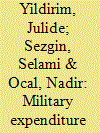

|
|
|
| 5 |
ID:
098416
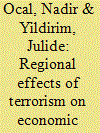

|
|
|
|
|
| Publication |
2010.
|
| Summary/Abstract |
The economic growth effects of terrorism have generally been examined in a cross-country framework where socio-economic differences among the countries are ignored. This highly restrictive assumption may result in heterogeneity bias, which could be overcome by resorting to country studies rather than cross-country analysis. Moreover, the relationship between the terrorist incidents and various factors may not be stationary in space. The majority of terrorist incidents in Turkey are concentrated mainly in Eastern, and South Eastern Turkey and big cities. Thus, the geographical dispersion of terrorist incidents in Turkey may result in uneven regional impact, necessitating local parameter estimates. This study analyses the effects of terrorism on economic growth across provinces of Turkey for the time period 1987-2001. Following a traditional global regression analysis, spatial variations in the relationships are examined with geographically weighted regression (GWR) to obtain locally different parameter estimates. A GWR approach allows the modeling of relationships that vary over space by introducing distance-based weights to provide parameter estimates for each variable and each geographical location. Empirical evidence indicates that a GWR model significantly improves the model fitting over the traditional global model. Even though the traditional convergence analysis reveals that terrorism hinders economic growth, GWR results indicate that its provincial effects are more pronounced for the Eastern and South Eastern provinces compared to the Western provinces. Moreover, empirical findings suggest that there is a considerable variation in speeds of convergence of provinces, which cannot be captured by the traditional beta convergence analysis.
|
|
|
|
|
|
|
|
|
|
|
|
|
|
|
|